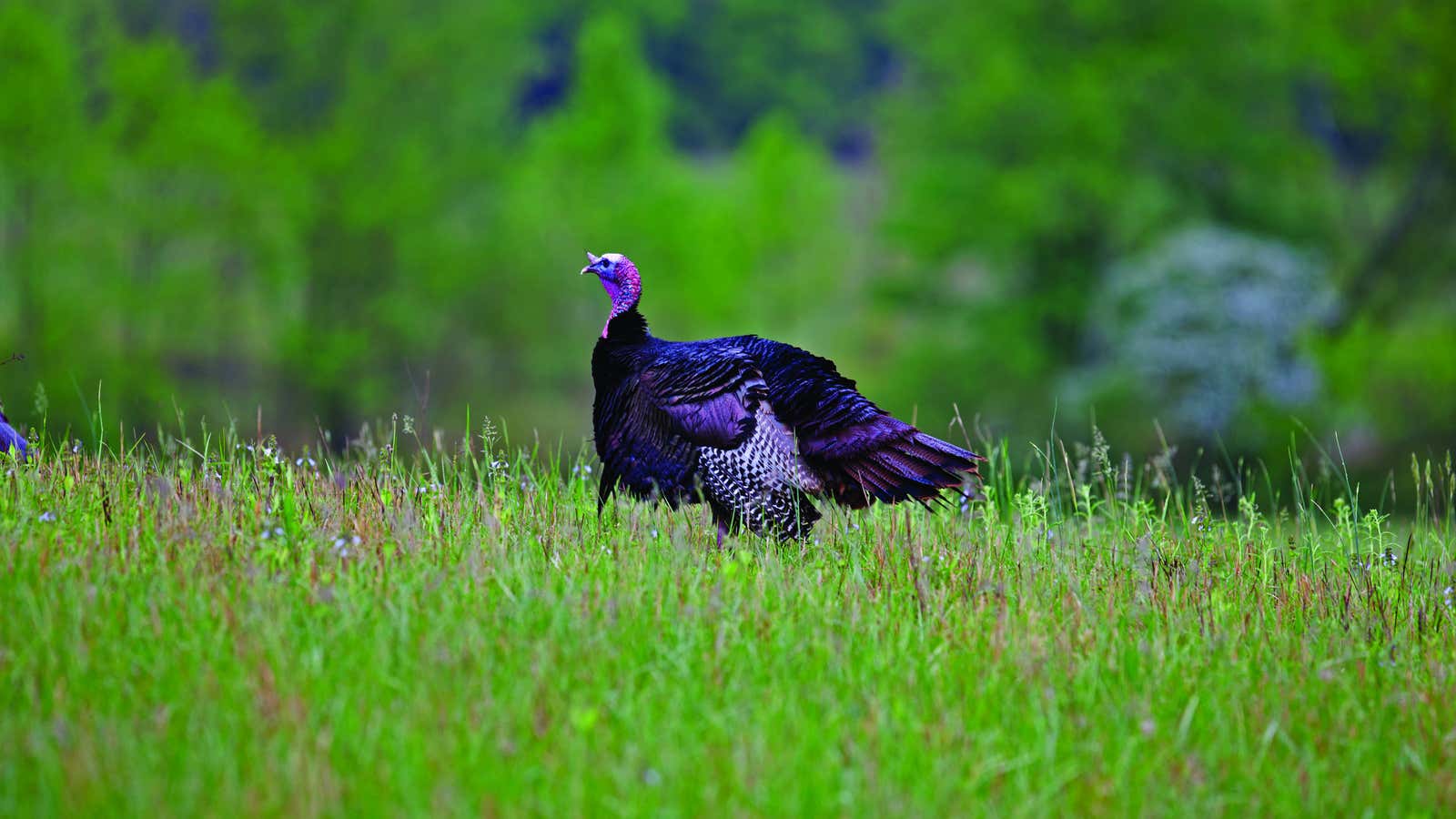This Thanksgiving, Americans will eat an estimated 46 million turkeys, and while nearly all of them will be the same old kind of bird that everyone ate last year and the year before, a few lucky families will carve into a tastier, more authentic turkey.
Heritage turkeys look, grow, and act differently than their more recent hybrid cousins that you’ll find at almost every feast, the Broad Breasted Whites (BBWs). Bred to grow large quickly, the standard BBWs are so breasty that they can’t even mate—the male’s front is too large to allow him to mount the female. (Turkeys have been fertilized through artificial insemination since the 1960s.) Even when raised on an organic farm—without growth-stimulating antibiotics and with plenty of room to move around and feel the sunlight on their wattles—the BBWs are still too big to fly for more than a few flutters, only live for a few months, and bear little resemblance to their colonial-era forebears.
Heritage turkeys, on the other hand, don’t just fly; Mary Pitman of Pitman Farms, who raises organic and free-range BBWs and heritage birds, tells Quartz the heritage turkeys actually fly into her trees and have to be corralled down. They spend so much time running, she says, that when her farm tried slaughtering them a month later, to give them more time to eat and put on weight, it was all for naught. “They didn’t gain an extra pound,” she says.
The heritage breeds—including Narragansett, Standard Bronze, and Spanish Black—harken back to the Thanksgivings of yore, or at least to 1874 when the American Poultry Association published its American Standard of Perfection with descriptions of each. And because they need more time to reach their ultimate weight, they live about twice as long—and therefore require twice the feed and labor—as the BBWs, even the organic ones. (Heritage birds get slaughtered when they’re 7-8 months old, whereas standard organics meet their maker after three to four.)
Foodies and producers alike rave about the taste of heritage birds, which owing to their very different body type and activity level yields a bird with more dark meat and a richer, more robust flavor. “Because they’ve been moving around much more, their muscles are better defined and there’s more grain and texture,” says Nick Maravell whose farm raises both organic heritage birds and organic BBWs. Ryan and Stuart Joyce of Joyce Farms say you don’t even need to brine them or slather them up with gravy. The thicker skin gets crispier and with their proportionately sized breasts, so it’s easier to cook a heritage bird evenly without drying parts out. But if you and your guests are diehard white meat lovers, this is not the bird for you.
Heritage birds, though, are smaller, much more expensive (at about $8 pound compared to about $4/pound for organic), and these days, hard to come by as consumer demand increases.
While Roger Mastrude of the Heritage Turkey Foundation tells Quartz that production has plateaued in the past few years, with about 20,000-30,000 birds available in 2015, individual producers say they are increasing their flocks, but can’t keep up with demand. The Stuarts told Quartz that they’ve increased their flock 85% annually. Pitman, one of the largest producers of heritage turkeys, said they raise as many as they can, but because these birds breed naturally, there’s a limit to how many are available. Both say they sell out each year.
But Mastrude points out that there is still plenty of room to grow—you’ll only find heritage turkeys in grocery stores in about eight states. That’s largely because small growers like Maravell often sell direct to consumers and there aren’t enough big growers like Pitman.
In the meantime, he recommends consumers visit LocalHarvest’s website to find a producer nearby. Everyone sold out? Maravell, who raises all of his birds the same way, on pasture and without antibiotics, has some advice for finding the best bird—heritage, organic, or none of the above: “If you can call the farm and ask a couple of questions then that’s probably the turkey you want to buy,” he says. Pitman makes that easy enough: She puts her phone number on the package of every bird she sells and answers questions through her Turkey Hotline, all Thanksgiving Day long.
